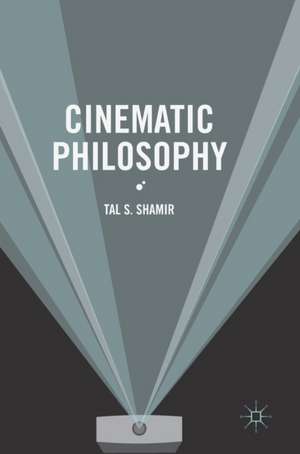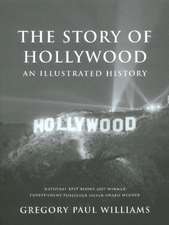Cinematic Philosophy
Autor Tal S. Shamiren Limba Engleză Hardback – 9 sep 2016
In this book, Tal S. Shamir sets out to identify cinema as a novel medium for philosophy and an important way of manifesting and developing philosophical thought. The volume presents a comprehensive analysis of the nature of philosophy’s potential—or, more strongly put, its need—to be manifested cinematically. Drawing on the fields of cinema, philosophy, and media studies, Cinematic Philosophy adds film to the traditional list of ways through which philosophy can be created, concentrating on the unique potential of the cinematic medium to effectively put forward and create philosophy. In the process, the book opens up innovative horizons for new types of knowledge and wisdom grounded in contemporary contexts and philosophical thought. Philosophy, best characterized as the love of wisdom, is not dependent on a specific medium nor solely situated within written text or oral lectures. Shamir asserts that philosophy can, should, and must be manifested and identified in a range of different platforms.
| Toate formatele și edițiile | Preț | Express |
|---|---|---|
| Paperback (1) | 635.80 lei 6-8 săpt. | |
| Springer International Publishing – 22 apr 2018 | 635.80 lei 6-8 săpt. | |
| Hardback (1) | 640.24 lei 6-8 săpt. | |
| Springer International Publishing – 9 sep 2016 | 640.24 lei 6-8 săpt. |
Preț: 640.24 lei
Preț vechi: 753.22 lei
-15% Nou
Puncte Express: 960
Preț estimativ în valută:
122.51€ • 128.34$ • 101.53£
122.51€ • 128.34$ • 101.53£
Carte tipărită la comandă
Livrare economică 08-22 aprilie
Preluare comenzi: 021 569.72.76
Specificații
ISBN-13: 9783319334721
ISBN-10: 3319334727
Pagini: 232
Ilustrații: X, 226 p. 1 illus.
Dimensiuni: 148 x 210 x 20 mm
Greutate: 0.41 kg
Ediția:1st ed. 2016
Editura: Springer International Publishing
Colecția Palgrave Macmillan
Locul publicării:Cham, Switzerland
ISBN-10: 3319334727
Pagini: 232
Ilustrații: X, 226 p. 1 illus.
Dimensiuni: 148 x 210 x 20 mm
Greutate: 0.41 kg
Ediția:1st ed. 2016
Editura: Springer International Publishing
Colecția Palgrave Macmillan
Locul publicării:Cham, Switzerland
Cuprins
Introduction I. Central Innovations & Clarifications.- Introduction II. Summary.- 1. Foundation I—The Evolution of Film and Philosophy.- 2. Foundation II—The Critique of Film and Philosophy.- 3. Foundation III—Thought Experiments.- 4. Why Philosophy Has Always Needed Cinema.- 5. Cinesophia.- 6. The Intimate Relation between Art and Truth.- 7. Cinematic Philosophy—A New Platform for Philosophy.- 8. Cinematic Examples.- Conclusion: The Vision of Cinematic Philosophy.- Epilogue.- Bibliography.
Notă biografică
Tal S. Shamir has directed dozens of films and exhibitions. His awards include a gold medal in the Academy of Motion Picture Arts and Sciences' 2011 Student Oscars. He holds a PhD in cinematic philosophy from the European Graduate School, Switzerland, and is currently working on his first feature film.
Textul de pe ultima copertă
In this book, Tal S. Shamir sets out to identify cinema as a novel medium for philosophy and an important way of manifesting and developing philosophical thought. The volume presents a comprehensive analysis of the nature of philosophy’s potential—or, more strongly put, its need—to be manifested cinematically. Drawing on the fields of cinema, philosophy, and media studies, Cinematic Philosophy adds film to the traditional list of ways through which philosophy can be created, concentrating on the unique potential of the cinematic medium to effectively put forward and create philosophy. In the process, the book opens up innovative horizons for new types of knowledge and wisdom grounded in contemporary contexts and philosophical thought. Philosophy, best characterized as the love of wisdom, is not dependent on a specific medium nor solely situated within written text or oral lectures. Shamir asserts that philosophy can, should, and must be manifested and identified in a range of differentplatforms.
Caracteristici
Offers a valuable contribution and new direction to a robust interdisciplinary conversation about philosophy and film Conversant in the literature of both philosophy and cinema studies Makes compelling use of thinkers like Martin Heidegger, John Dewey, Friedrich Nietzsche, and others to explore the notion of art as disclosing truth






